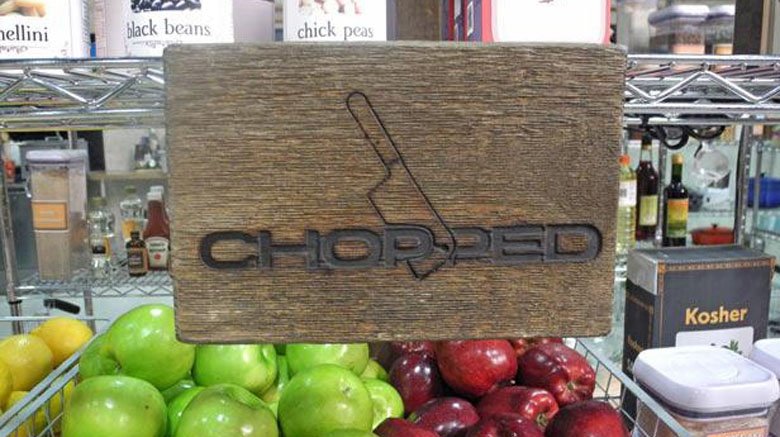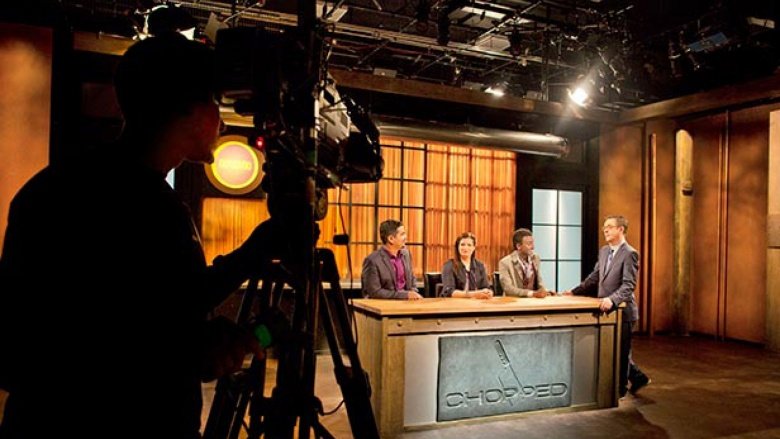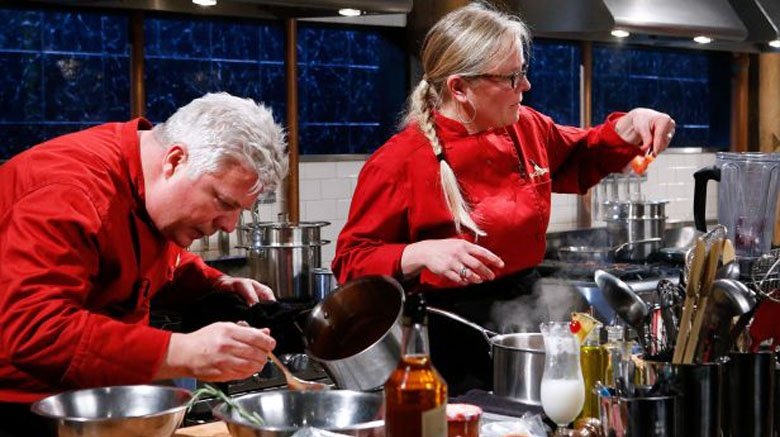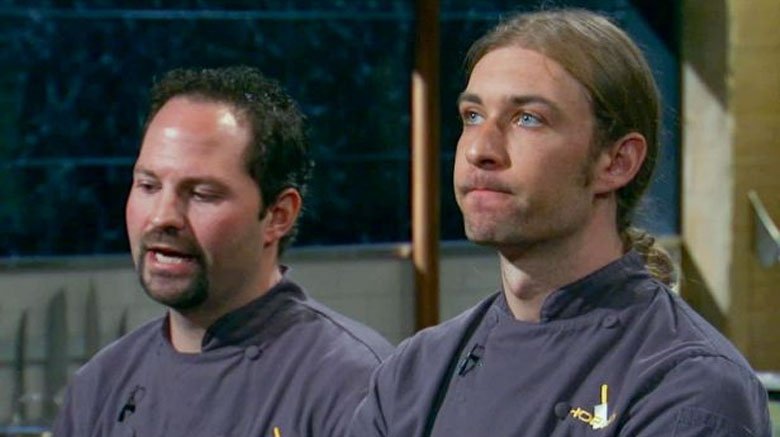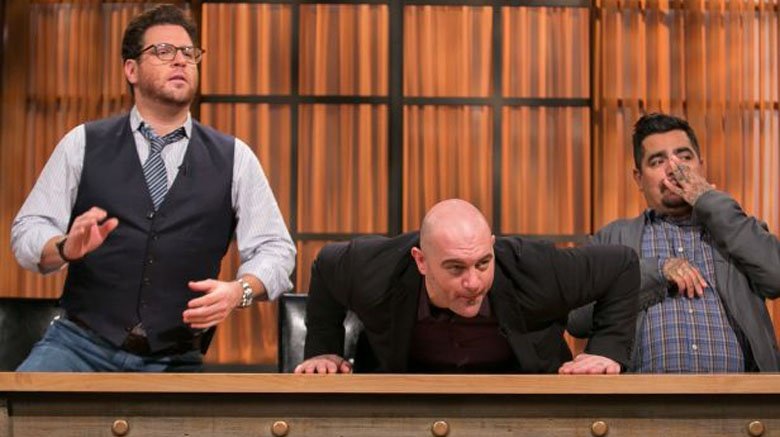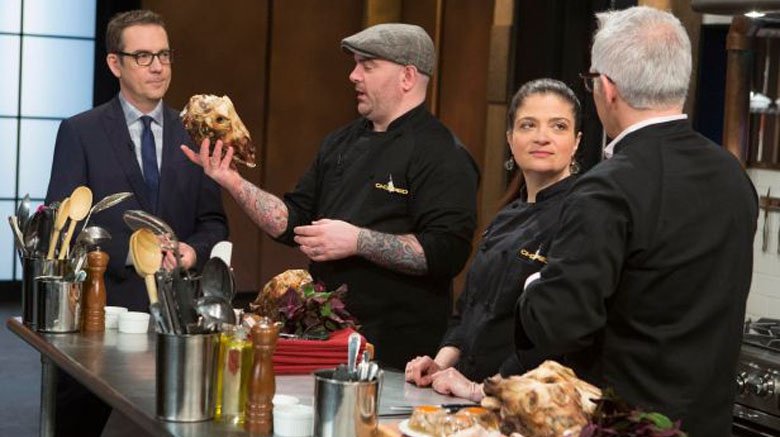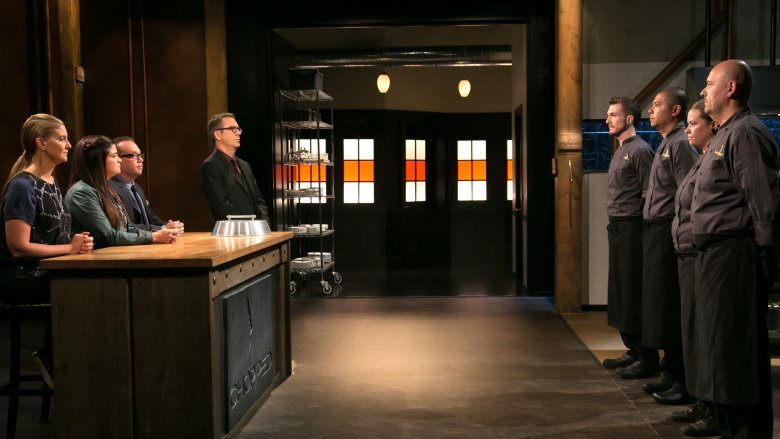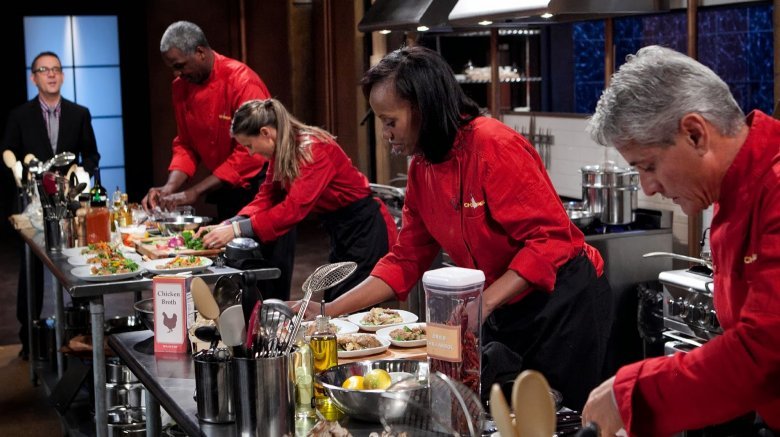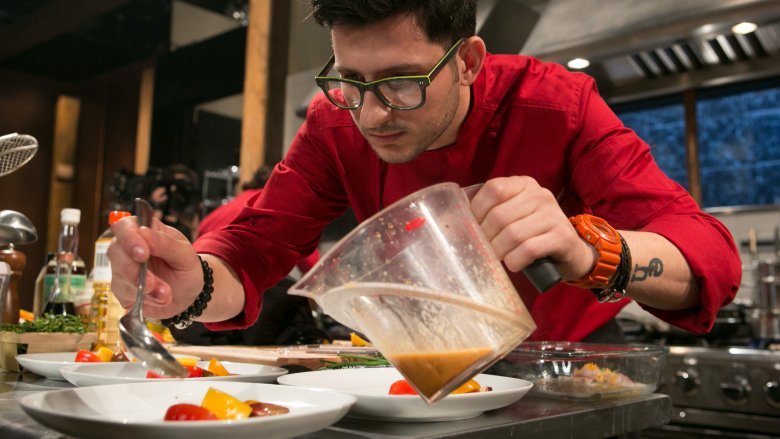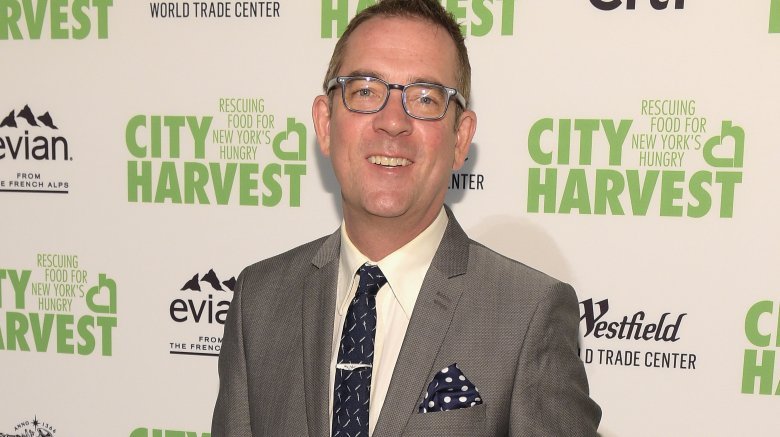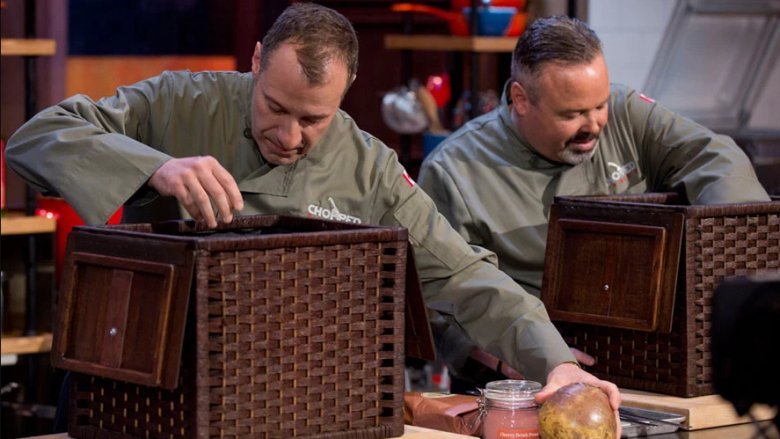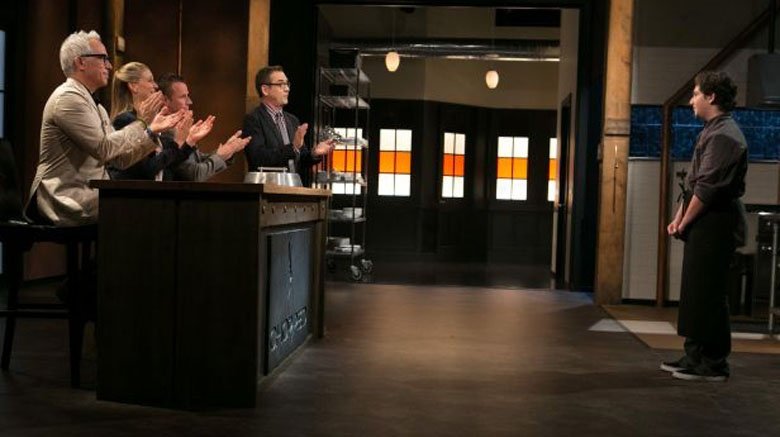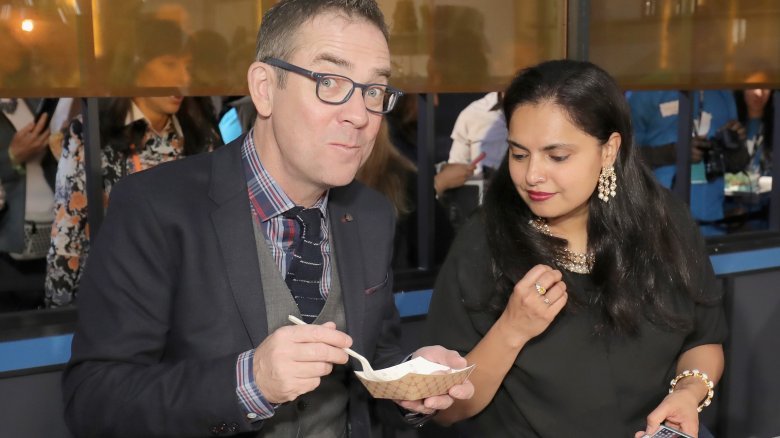The Untold Truth About Chopped
Chopped is the hit Food Network show that pits four chefs against one another in three fast-paced rounds of cooking. In each round, the chefs must transform unusual mystery ingredients into delicious dishes. The phenomenal popularity of the show has spawned several spin-offs, including Chopped Junior, Chopped: Canada, and several All-Stars: Celebrities episodes. So, what are the behind-the-scenes secrets that make this show a recipe for success? We found out.
Shooting an episode is a ton of work
It takes a crew of 75 people around 80 hours to shoot a single episode of Chopped, according to Food Network. That's pretty remarkable considering it's actually just 42 minutes of programming, minus the commercials. Contestants have claimed their days stretched well into the 18-hour range.
Aside from the camera crew, there is a cadre of people responsible for meticulously stocking the pantry and styling it for the cameras, as well as taking care of contestants' needs. Then there's that mystery basket. It looks like randomly thrown together ingredients that producers found digging through dorm room trash cans, but it's actually a carefully curated selection, designed specifically to create culinary problems ranging from near-impossible cook times to unpalatable flavor combinations. Thought a meal made from chicken in a can, clam chowder, potato tots, and skirt steak sounded like a mean-spirited dare? Nope. A crew of television professionals probably had several lengthy meetings about that.
Contestants are well-prepped
Aside from Chopped Junior, the contestants are usually seasoned vets in the kitchen. Some have more experience than others, but almost all have had culinary training, either from school or years on the line. What this means is technique comes second nature to them, so while viewers are freaking out at just the concept of pickled octopus, the contestants already know precisely how long it will take to caramelize that specific protein in a saute pan. That means the chef's biggest challenges are the clock and their unfamiliar surroundings. One contestant told A.V. Club that the open workspace was a relative paradise compared to his usual cramped quarters, and that competitors also got a tour of the pantry, instructions on how to use all of the equipment, as well as an oven preheated to 350 degrees, and a pot of boiling water. All they have to bring are knives, nerves of steel, and a mental lineup of delicious recipes they can whip up using yeast extract and chicken hearts.
Producers ramp up the drama
Contestants Josh Lewis and Allison Robicelli claimed producers tried to goad them into trash talking their competition. This is a standard reality TV technique to try to increase the tension of an otherwise banal situation—like certain housewives who do literally nothing but eat salads at dinner parties in the Hamptons—but the brotherhood of the kitchen is apparently too strong for that kind of nonsense. Lewis told A.V. Club, "I refused. That's not me," while Robicelli was more pointed in her critique of the sabotage attempts: "I'd much rather try to get attention by making people laugh than by hurting others in order to appeal to the lowest common denominator."
This is an apparently widespread attitude among culinary professionals—the ones who appear on the show at least—because there is little to no trash talk on Chopped. "Despite the competitive streak, there also is a code in the kitchen that you help one another," host Ted Allen told Yahoo TV. "We've tried for ages to get them to sabotage one another (laughs), and they just won't do it."
Here's how the judging really works
The judges use scorecards to record their notes on the "presentation, taste, and creativity" they're looking for in each dish. They claim they don't knock anything for getting cold, since they taste the dishes in succession, and they also give the contestants plenty of time to explain their choices. Former contestant Lewis told A.V. Club the judges spend "about 10 or 15 minutes on each person's dish. It's pretty in-depth, not just, 'needs more salt.'" Then, the judges actually inspect the contestants' work stations, tasting sauces left in pans, checking for cleanliness, and even trying things the contestants may have left off the plate. This all factors into the lengthy deliberation over who is getting chopped. According to Reality Blurred's interview with judge Amanda Freitag, the panel may take 30 to 40 minutes to reach a decision.
Another big question: why do contestants always make four plates when there are only three judges? According to A.V. Club, the extra serving is for photographs and to reveal when someone gets chopped. Let's hope producers are nice enough to at least let the show's host have a bite of that one when they're finished with it.
The food served to contestants wasn't very good
You would assume the catering for a show that's widely considered to be one of the highest-caliber cooking competitions on television would be pretty good. Think again.
According to former contestant Robicelli's blog, competitors were served "cold, rubbery eggs" for breakfast and "likely the worst salad I have ever had in my entire life" for lunch. Past competitor Lewis was more diplomatic, saying the off-site caterer "wasn't good," and "no one ate much of it." To the show's credit, teen chef Sequoia Pranger said she felt like she was treated to a "luxury experience" backstage, although she mostly requested "ginger ale and fruit cups."
Hopefully, those few bad experiences weren't the norm, but who knows? Maybe the showrunners thought it would be confusing to load the contestants up on caviar and foie gras, then send them onto the set to make desserts out of cow brains and potato chips.
Producers keep a close eye on contestants
In his interview with AV Club, Chef Lewis revealed that contestants film their "talking-head" interviews after their segments are completed. Allegedly, that's when producers bring up a laundry list of things contestants may have forgotten they did during the competition.
"I was shocked by how much they wrote down and asked me about," he said. They had stuff that I hadn't even realized happened while filming. Like, apparently I freaked out. I couldn't find something and my hands started flailing and I kept repeating the same thing over and over again. I did not remember that happening until they asked me about it, and actually I was shocked when they didn't include that in the final broadcast. Shocked and pleased, since I actually think I came off pretty professionally." He continued, "There was another time when they thought I had cut myself, and they kept asking me about that, but I hadn't. I just had some onion skin on myself."
Is this Chopped or Big Brother?
The food looks different on TV
Watching Chopped on an empty stomach is never a good thing to do; oftentimes, the food looks so delicious, you'll immediately want to run out to the grocery store to try to replicate the TV creation at home.
However, according to Chef Cole Dickinson, the food on your screen doesn't always look the same in person. Speaking to BuzzFeed about one particular dish, he said, "The [fish] I made was the most visually appealing dish, but when I saw it on TV, it looked like s**t. It looked horrible. What looked best was the [sautéed lamb], but when I plated it, I thought, 'this looks like s**t.'"
It's a game show, not a cooking competition
In her blog for Medium, contestant Robicelli described being on Chopped as less like a relaxing trip to Ina Garten's house and more like trying to fight your way out of the movie TRON.
"Chopped is not a 'cooking competition.' Chopped is a game show," she wrote (albeit dramatically). "It doesn't have as much to do with making good, or, hell, even edible food; it has everything to do with navigating an obstacle course in a small amount of time, with unknown supplies and constant surprises."
"Chopped was, without question, one of the most physically and emotionally torturous experiences of my entire life," she continued.
But, but, but the food looks so good!
Ted Allen isn't allowed to sit down
Given that the show takes so long to film, you'd think that Chopped would occasionally offer Ted Allen a stool to sit on or a seat at the judge's table.
Not exactly. In an interview with Food Network, the beloved host revealed, "I never get to sit down. I've asked; they said no. I don't know why they're obsessed with making me stand up all the time. Maybe it's kind of like exercise. Yet people in New York City pay good money to exercise, and they have to pay me to do it."
The mystery basket is carefully crafted
If you thought the ingredients in the mystery baskets were chosen at random, think again. In fact, in an interview with Food Network, host Allen revealed that "the basket's ingredients are chosen by a committee that's led by our staffer Sara Hormi." He said the contents are "designed to be possible but difficult...So if we give you, say, tomatillos, flatbreads and silky tofu, obviously we're looking for a play on grilled cheese and tomato soup, right? The funny thing is the chefs don't have a lot of time to think about it. In fact, they have no time to think about it, and they really don't know what the ingredients are, so they don't usually figure out what the riddle is inside the basket, but there definitely is an intention."
"Once in a while, the judges or myself will look at a basket and say, 'This is just too mean or just too hard,' and we'll ask if something can be switched out," Allen said, "and usually they'll do that for us if our concerns are legit, but there's a lot of thought process that goes into choosing those ingredients."
Benefits extend beyond the episodes
Aside from the 1,000 bucks contestants get even if they lose, appearing on Chopped has all sorts of side benefits. After her episode, Pranger, the teen contestant, was reportedly treated by judge Chris Santos, along with the three other teen competitors, to an amazing meal at his top-rated New York restaurant, then offered internships. Contestant Lewis was hired by judge Freitag, and she even added a salsa he made on the show to her menu. Contestant Robicelli admitted that even though she lost, the show was basically a 60-minute commercial for her cookbook. These kinds of examples go on an on. One Chopped champion even turned his winning performance into a budding TV career. It's ironic that a show that makes culinary professionals work with food most people wouldn't eat on a dare turns out to be one of the best things that could happen to their careers.
A lot of jokes get cut in the editing room
According to host Allen, Chopped could be a much raunchier show if the jokes that he and the judges make while filming actually made it into the final cut. "The judges and I tell very risqué jokes," he told Yahoo! TV, "but you don't see it because Food Network is very G-rated."
Perhaps Food Network will release an uncensored cut of Chopped on DVD. Here's hoping.

